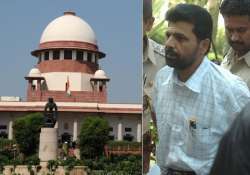Can mercy plea be filed before Governor after President rejects it: SC asks Centre
New Delhi: Without referring to 1993 Mumbai serial blast death row convict, Yakub Abdul Razak Memon, the Supreme Court asked the Central government whether a death row convict can move mercy plea before the Governor

New Delhi: Without referring to 1993 Mumbai serial blast death row convict, Yakub Abdul Razak Memon, the Supreme Court asked the Central government whether a death row convict can move mercy plea before the Governor after a similar petition gets rejected by the President.
The matter echoed yesterday in the apex court during a hearing on the Centre's petition questioning the Tamil Nadu government's decision to remit sentences of seven life convicts in Rajiv Gandhi assassination case and release them.
Apex court's constitution bench comprising Chief Justice HL Dattu, Justice Fakkir Mohamed Ibrahim Kalifulla, Justice Pinaki Chandra Ghose and Justice Abhay Manohar Sapre, repeatedly asked Solicitor General Ranjit Kumar whether a person could endlessly move mercy petitions after his/her mercy plea was rejected by the President.
After the top court on July 21 rejected Yakub's curative petition, the 1993 Mumbai bomb blasts convict submitted a mercy petition for the Maharashtra Governor. The move was aimed to prevent execution of his death sentence on July 30.
President Pranab Mukherjee had rejected Yakub's mercy petition in May last year.
"As per the Constitution, the President has the power to entertain a mercy petition from anywhere in India irrespective of whether the person was awarded death penalty under a central law or a state law. But the Governor can only deal with cases arising within the state jurisdiction and when the death penalty was imposed through a state enacted law. Can a condemned prisoner move the governor after the President rejects his mercy plea?" the SC bench observed.
Finding some ambiguity in the procedure, the court asked the Solicitor General if it should lay guidelines in this regard or was there a procedure formulated by the Ministry of Home Affairs.
"See the embarrassment. The President rejects the mercy plea. The condemned prisoner files a fresh mercy plea before the Governor who commutes the death penalty to life imprisonment. Did the framers of the Constitution envisage this? I don't think so. Is it not an incongruous situation? Can a person after losing his case before a High Court go before the district court and appeal," the CJI questioned.
The Centre on Tuesday asked the Supreme Court not to show any mercy to the killers of former Prime Minister Rajiv Gandhi and pointed out the assassination was the result of a conspiracy involving foreign nationals.
The Solicitor General argued that there was no bar under the law for a death row convict to move multiple mercy petitions.
"A condemned prisoner files mercy petition before the President or the governor. When it gets rejected, he moves the constitutional courts alleging that his mercy petition has been rejected without proper appreciation of facts and circumstances. When that petition gets rejected, he again moves another mercy petition. And the cycle is continued," the Solicitor General said.
The serial blasts in March 1993 had left 257 dead and over 700 injured. Yakub Memon is the only convict whose death sentence was upheld by the Supreme Court.